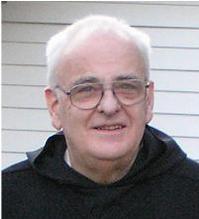 The Benedictine Abbots are going home now. They've
been meeting in Rome since the 17th. Their work was not deliberative
in any meaningful way as much as they gathered for the reason to elect an abbot primate, to gain perspective, to meet new and old monastic superiors, to hear how the worldwide Benedictines can assist one another in living the life more effectively and intensely according to the Holy Rule and the mind of the Church. Time was spent in prayer, study, and pilgrimage. How could one not spend time in prayer before the holy places of the martyrs in Rome as well as some of the central points of interest to Benedictines. Cindy Wooden from CNS published this
article today as a sort of synopsis of one aspect of Benedictine life--the
attraction of new members. Father Michael Casey, a Trappist monk, priest, author and speaker, addressed the assembly. He, by the way, is one of my favorite contemporary monastic thinkers. If only the abbots and other monastic superiors would listen to Father Michael. Alas, they're too timid and many can't (won't?) do the hard work necessary to figure out what they ought to do so as to not live in diminishment mode. One often gets the feeling that some monasteries would rather die than alter their Benedictine observance and the adherence to Christ and the Church. But, I will say that despite a lack of clear and intense thinking, praying and living, there are significant points of like for Benedictine monasticism in the USA.
The Benedictine Abbots are going home now. They've
been meeting in Rome since the 17th. Their work was not deliberative
in any meaningful way as much as they gathered for the reason to elect an abbot primate, to gain perspective, to meet new and old monastic superiors, to hear how the worldwide Benedictines can assist one another in living the life more effectively and intensely according to the Holy Rule and the mind of the Church. Time was spent in prayer, study, and pilgrimage. How could one not spend time in prayer before the holy places of the martyrs in Rome as well as some of the central points of interest to Benedictines. Cindy Wooden from CNS published this
article today as a sort of synopsis of one aspect of Benedictine life--the
attraction of new members. Father Michael Casey, a Trappist monk, priest, author and speaker, addressed the assembly. He, by the way, is one of my favorite contemporary monastic thinkers. If only the abbots and other monastic superiors would listen to Father Michael. Alas, they're too timid and many can't (won't?) do the hard work necessary to figure out what they ought to do so as to not live in diminishment mode. One often gets the feeling that some monasteries would rather die than alter their Benedictine observance and the adherence to Christ and the Church. But, I will say that despite a lack of clear and intense thinking, praying and living, there are significant points of like for Benedictine monasticism in the USA.What follows is an extract of what was published (read the text in full here):


One of the main speakers at the Benedictine abbots'
congress was Cistercian Father Michael Casey, an expert on monastic
spirituality from Tarrawarra Abbey in Australia.
Maintaining tradition while
responding to changing needs is an inescapable part of life, both for
individuals and for religious communities, he said. "The fact that we are
alive means that we are continually influenced by our past, continually
interacting with our present, and looking forward to the future. It's really
just a matter of personal integrity, personal vitality that we do respect and
allow our past to continue speaking to us."
Father Casey said he would object to labeling "conservative" the young people who are attracted to older forms of Catholic religious life, habits and liturgy.
"People are looking for a clear alternative to the way they were brought up, just as many of the more free-wheeling religious communities are reacting to the tight discipline of their own youth," he said.
"I sometimes doubt whether the new generation are as conservative as they are sometimes labeled," Father Casey said. "I think what has happened is that they've gone up to the attic, they've rummaged around and found all sorts of things which they think are good and exciting."
"What they are really doing," he said, "is rejecting what their parents thought was valuable, and they've discovered -- with a great sense of adventure -- a new way of doing things," including practices set aside by the previous generation.
"But there isn't this kind of grim return to the past," he said. "It's a very light and joyful discovery that here's something that's been laying, gathering dust for years and it still has a value for us."


Leave a comment